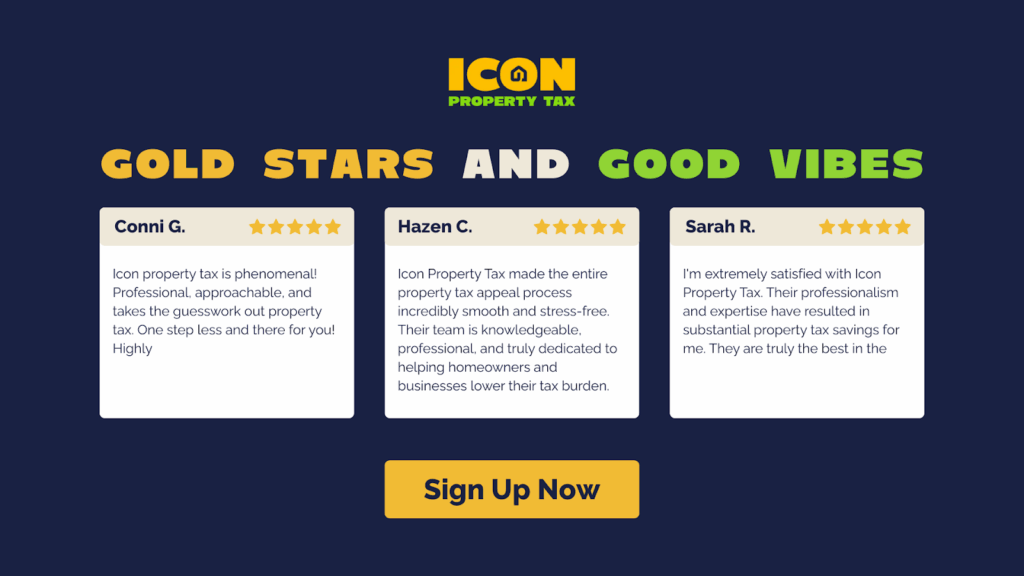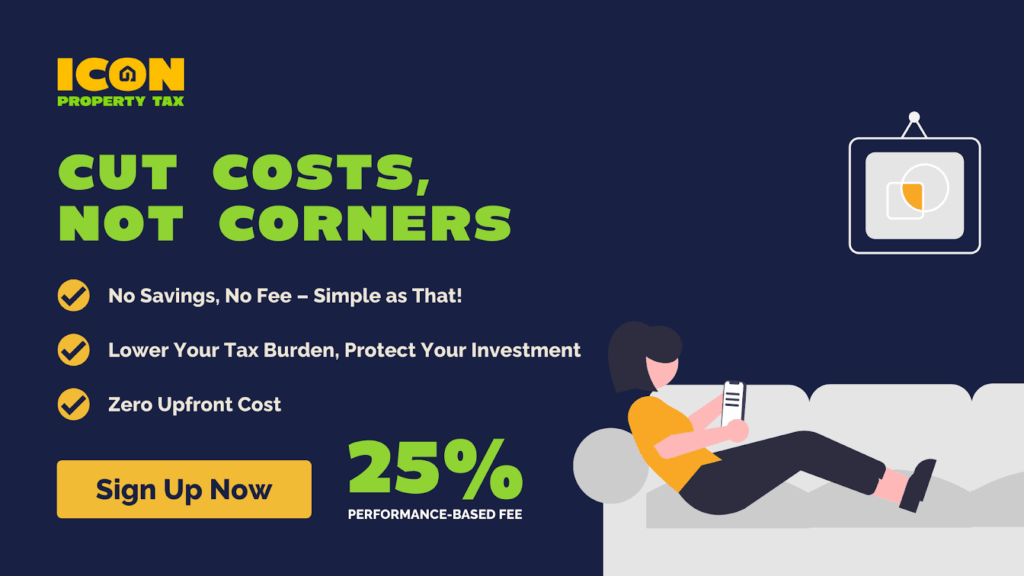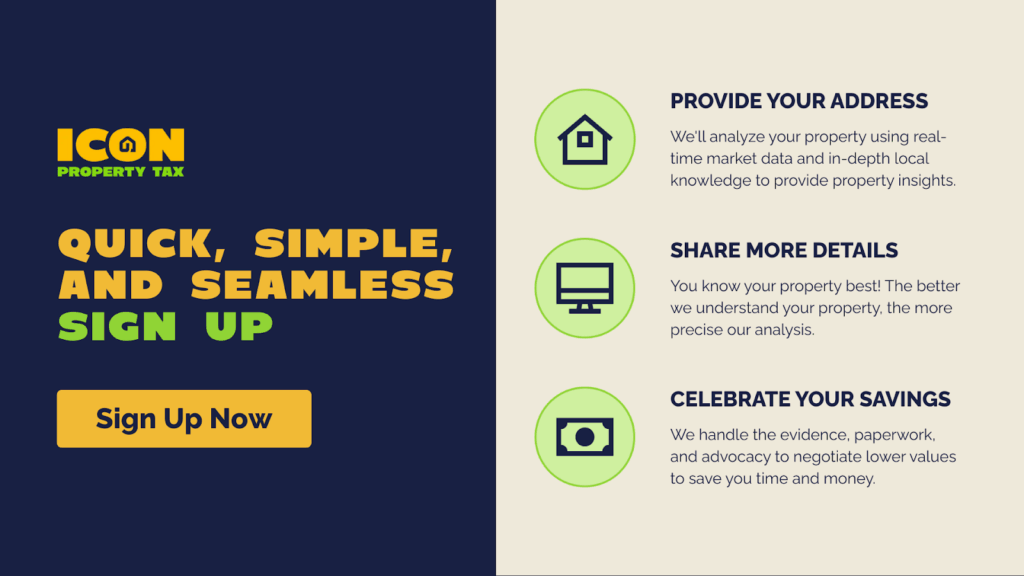Can You Avoid Property Taxes? States With No Or Low Rates
August 10, 2025
Key Takeaways:
- No True Zero-Tax State: Every U.S. state charges some form of property tax, even those with reputations for being “tax-free.”
- Savings Without Relocating: Homeowners can reduce their property tax burden through exemptions, appeals, and correcting assessments.
- Professional Help Pays Off: Services like Icon handle appeals and save you money, and you pay nothing unless they reduce your tax bill.
When conversations around “states with no property tax” come up, it’s easy to assume there are magical places where owning property comes tax-free. But in reality, property taxes exist in every U.S. state, and the real opportunity isn’t in escaping taxes altogether, but in understanding where they’re lowest and how you can minimize your liability legally and strategically. Whether you’re considering a move, managing a portfolio, or just trying to protect your home’s value, knowing the truth behind low-tax states can help you make smarter decisions.
As one of the nation’s leading property tax advocacy firms, Icon has helped thousands of homeowners and real estate investors reduce their tax burden, and we only get paid when you save. Our data-driven approach, local tax expertise, and zero-risk pricing model make us the go-to resource for anyone serious about cutting unnecessary property tax costs.
In this piece, we’ll break down the question of states with no property taxes, highlight those with the lowest rates, and show you how to reduce your tax burden without relocating.
Understanding Property Taxes In The U.S.
Property taxes are a significant source of revenue for local governments, funding essential services like public schools, road maintenance, police departments, and emergency services. As a homeowner or property investor, these taxes are part of your long-term cost of ownership, and depending on where you live, they can be substantial.
Every state has its own way of assessing and collecting property taxes. Local tax authorities determine the rate, typically based on your property’s assessed value and the tax rate set by the jurisdiction. This means two similar homes in different states or neighboring counties could face dramatically different tax bills.
Even though there’s no such thing as a completely tax-free property in the U.S., some states and counties do offer significantly lower rates than others. That’s why understanding how property taxes work is the first step to making smarter financial decisions, whether buying, investing, or looking to cut your current tax burden.

Is It Really Possible To Avoid Property Taxes?
In short: not entirely. No state in the U.S. completely eliminates property taxes across the board. However, some states come close by offering very low rates, generous exemptions, or alternative tax structures that make the burden lighter for homeowners.
Even in states with no personal income tax, like Texas or Florida, property taxes often pick up the slack, leading to higher-than-average bills. Conversely, states with low property taxes might make up for it with higher sales or income taxes. It’s all about trade-offs, and property taxes are just one piece of the broader tax landscape.
Understanding where the rates are lowest, who qualifies for exemptions, and how to structure your ownership to minimize liability is crucial. The right strategies and experts can help.
Want to see if you’re overpaying? Lower your tax burden, protect your investment with Icon.
States With The Lowest Property Tax Rates
While no state completely eliminates property taxes, several offer rates well below the national average. These states can attract retirees, investors, or homeowners looking to reduce long-term housing costs.
Here are some of the states with the lowest average effective property tax rates:
- Hawaii – 0.29%: Thanks to high property values and alternative revenue sources like tourism taxes, Hawaii boasts the country’s lowest average property tax rate.
- Alabama – 0.41%: Alabama combines low home prices with one of the most affordable property tax rates nationwide.
- Colorado – 0.48%: The state’s residential assessment ratio helps keep property taxes lower for homeowners.
- Nevada – 0.50%: Nevada’s favorable tax cap and no state income tax make it a popular choice for relocation.
- Louisiana – 0.55%: Louisiana’s homestead exemption significantly reduces tax burdens for primary residences.
It’s important to note that these rates can vary based on county or municipality. What matters most is not just the rate itself, but how it applies to your specific situation.
Considering a move or an investment in one of these states? Icon helps you make informed decisions and avoid overpaying.
States Commonly Thought To Have No Property Tax
There’s a persistent myth that some U.S. states don’t charge property taxes. While the idea is appealing, it’s not accurate. Every state imposes some property tax, even if the amount is small or offset by exemptions.
So why do people think some states have no property taxes?
Often, it’s due to low effective tax rates or generous homestead exemptions that drastically reduce what homeowners actually pay. For example:
- Alaska: Some rural areas in Alaska have no property tax because they fall outside organized boroughs. However, cities and boroughs that do levy taxes often set their own rates.
- Wyoming: Known for its low taxes across the board, Wyoming has low property taxes, but they’re still present, especially in growing counties.
- West Virginia: With low home values and a relatively light tax burden, many homeowners pay very little in property taxes.
- Tennessee: No state income tax and a low property tax rate make it seem tax-free, but local jurisdictions still assess property taxes.
The truth is, “no property tax” often means low or heavily discounted property tax.
Want to know where your property stands? Stand your ground and make sure you’re not overpaying.
Factors That Influence Property Taxes By State
Property tax rates aren’t random. They’re a mix of local policies, economic needs, and public funding priorities shape them. Here are some of the most significant factors that determine how much you’ll pay, depending on the state:
Local Budget Needs
Counties and municipalities use property taxes to fund services like schools, fire departments, and infrastructure. The more a community relies on these services, and the fewer alternative revenue sources, the higher the property taxes tend to be.
Property Assessment Practices
Some states reassess property values annually, while others do it less frequently. States with frequent reassessments can adjust their taxable value to match market trends, which could increase your tax bill during housing booms.
Homestead Exemptions
Many states offer partial property tax relief for primary residences. These exemptions can significantly reduce your taxable value, but they vary widely by state and even by county.
State-Level Tax Policy
States with no income tax (like Texas and Florida) often rely more heavily on property taxes for funding. Meanwhile, states with higher income or sales taxes may ease the pressure on property owners.
Local Tax Caps and Rollback Laws
Some states limit the increase in property taxes from year to year. These caps help stabilize costs, but not every state offers them.
Explore how Icon helps property owners reduce their debts, with zero upfront cost.
Relocating For Lower Property Taxes: Is It Worth It?
Moving to a low-tax state sounds like an easy win for some homeowners and investors. But the reality is more complex. Property taxes are just one part of a bigger financial picture, and relocating solely to reduce your tax bill isn’t always the most brilliant move.

Consider The Full Cost Of Living
States with low property taxes might have higher sales taxes, insurance premiums, or healthcare costs. Hawaii, for instance, has the lowest property taxes in the country, but one of the highest overall living costs.
Housing Market Differences
Cheaper property taxes don’t always mean more affordable homes. Home prices are rising rapidly in some low-tax states due to population growth and investor demand. That can offset any potential tax savings.
Access To Services
Low property taxes sometimes correlate with limited funding for public schools, emergency services, and infrastructure. Make sure you’re not sacrificing quality of life for savings.
Personal And Professional Impacts
Moving might affect your job, business, family life, and service access. Be realistic about what a move would mean beyond just the financials.
Smart Ways To Reduce Your Property Tax Bill Without Moving
Relocating isn’t your only option. In fact, many homeowners are overpaying on property taxes without even realizing it, and there are legal, proven strategies to lower your bill without leaving your home.
Challenge Your Property Tax Assessment
Counties assess your property’s value to calculate your taxes. If they’ve overestimated it, you’re paying more than you should. Filing an appeal can correct this, potentially leading to thousands in savings. Not sure how to challenge an assessment? Icon handles the process for you, no savings, no fee.
Apply For Homestead Or Other Exemptions
Many states offer exemptions for primary residences, seniors, veterans, or disabled homeowners. These reduce the taxable value of your home, sometimes dramatically.
Review Your Property Record For Errors
Mistakes happen. Square footage, lot size, or home improvements might be recorded incorrectly, leading to a higher tax bill than you actually owe.
Monitor Reassessment Cycles
Stay aware of when your county reassesses property values. You’ll want to be prepared, or proactive, especially if values are climbing in your area.
Hire An Expert
Property tax laws are complex and vary by location. Professional help can make a big difference, especially when navigating appeals or exemption eligibility.
How Icon Can Help You Lower Your Property Tax Burden
At Icon, property taxes can feel like a moving target, complex, inconsistent, and often unfair. That’s exactly why we exist: to help property owners take control of their tax liability without the stress, confusion, or wasted time. Here’s how we do it:
- Expert Appeals Handling: Our team evaluates your assessment, files the appeal, handles the paperwork, and represents your case, so you don’t have to.
- Data-Driven Results: We use real property data and local tax knowledge to build strong, evidence-backed appeals that deliver results.
- No Savings, No Fee: You only pay if we reduce your tax burden. There’s no risk, no upfront cost, and nothing owed unless we save you money. Learn more about how Icon Property Tax services can help you.
- Personalized Support: Whether you’re a first-time homeowner or managing a real estate portfolio, we tailor our approach to your property and goals.
Protect your investment and lower your tax burden, the smart way, with Icon.

Final Thoughts
Property taxes are unavoidable, but overpaying them isn’t. While no state offers an authentic “property tax-free” experience, some offer significantly lower rates or exemptions that can make a meaningful difference for homeowners and investors alike.
Still, moving isn’t the only answer. Often, the smartest strategy is ensuring your current assessment is fair and accurate and not costing you more than it should. That’s where Icon comes in, delivering expert help with no upfront fees and real savings when it matters most.
Whether you’re staying put or exploring your options, understanding how property taxes work and how to reduce them is essential to protecting your investment.
Read Also:
- DuPage County Property Tax Overview: Rates, Assessments, and Billing Cycles
- Kane County Property Tax Overview: Rates, Assessments, And Billing Cycles
- Will County Property Tax Overview: Rates, Assessments, And Billing Cycles
Frequently Asked Questions About States With No Property Taxes
What does “no property tax” really mean in the U.S.?
It usually refers to states with extremely low property tax rates or significant exemptions, not an actual absence of taxes. Every state has some form of property taxation, even if minimal.
Are property taxes the same across every county within a state?
No. Local governments set their own rates and assessments, so property taxes can vary significantly within the same state, even between neighboring counties.
Can you negotiate your property tax bill directly with the county?
Not directly. However, you can file a formal appeal to dispute your assessed value, which can lead to a reduction if supported by evidence.
Do property taxes go down when the real estate market drops?
Not immediately. Assessments often lag behind market trends. Your home value could fall, but your tax bill may not reflect it until the next reassessment cycle.
How do exemptions work for seniors or veterans?
Many states offer targeted exemptions that reduce taxable home value for seniors, disabled individuals, or veterans. These must typically be applied for annually.
Does owning rental property affect your property tax rate?
Yes, in many states, rental properties are taxed differently or lack exemptions available to primary residences. The rate may be higher for investment properties.
How does a state’s lack of income tax affect property taxes?
States that don’t collect income tax (like Texas or Florida) often rely more heavily on property taxes to fund services, which can result in higher rates.
Can new construction homes be taxed differently?
Yes. New homes may be subject to updated assessments sooner, and the tax value can increase significantly after the construction is complete.
Are agricultural or rural properties taxed differently?
In many states, agricultural land qualifies for reduced rates or special valuation methods. However, there are strict use requirements to qualify.
How often should I review my property tax assessment?
At least once a year, especially after home improvements, reassessments, or noticeable changes in your neighborhood’s market value.

